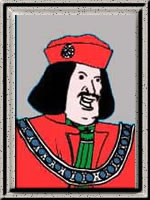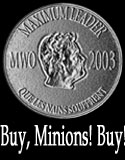Greetings, loyal minions. Your Maximum Leader will be celebrating today. Celebrating the anniversary of the birth of his favourite philosopher, Thomas Hobbes. Hobbes was born this day in 1588.
To mark this day, your Maximum Leader will repost a Hobbes post he did two years ago…
Thomas Hobbes was born in April 1588. His premature birth to a Vicar’s wife in Westport (near Malmesbury), Gloucestershire, during the reign of Queen Elizabeth I coincided with the threat of the Spanish Armada. Hobbes was later to comment that his mother gave birth to twins “myself and fear” that year.
Thomas’ father died when Thomas was young, and the young Hobbes was sent to live with a nearby uncle. Eventually, Hobbes left his uncle and secured an education at Oxford. He became a mathematics tutor to the powerful Cavendish family (who were the Earl’s of Devonshire), and eventually a tutor to Charles Stuart (later King Charles II of Great Britain).
Hobbes’ first published work was a translation of Thucydides “History of the Peloponnesian War.” He also published a number of mathematical treatises. But, for the sake of this blog, your Maximum Leader will focus on Hobbes’ political treatise, “Leviathan.” Hobbes published a number of political tracts, but they are all variations on the same set of political beliefs. Of these “Leviathan” is both best known, and most comprehensive.
In “Leviathan,” Hobbes creates a logical model of human nature, the nature of consent to government, and the authority of government. His opening chapters set out in detail the physiological elements of human action. While they are dated by our thinking today, they still accurately depict the modus operandi of human activity. It is when Hobbes begins to discuss human motivation that he begins in earnest his philosophical discourse.
To Hobbes, man is motivated by “appetites” and “aversions.” We act to acquire things we desire, and seek to avoid thing we do not desire or will cause us harm. Human appetites are constant, insatiable, and vary in degree from man to man. Man, therefore, has the power to act of his own accord to satisfy his appetites and avoid his aversions. Man acts to bring the greatest possible good to himself, using the means and methods at his disposal. In order to bring the greatest possible good to himself, man must acquire power over others.
To Hobbes there are two types of power, original (also called natural) power, and instrumental (also called acquired) power. Original power is that power that comes from the man himself. His physical strength is the clearest examples of a man’s original, or natural, power. But also considered an original power is man’s intellect and brain-power (if you will). Instrumental powers are those that flow from their acquisition. They include money, fame, reputation, and everyone’s favourite, God’s favour (or good luck as we might call it).
Having established the nature of man, and defined man’s power, Hobbes starts to get really interesting. He asserts that the exercise or acquisition of power by one man naturally hinders or limits the exercise or acquisition of power by another man. Given that man’s appetites are insatiable; this puts man in an uncomfortable position of always being at odds with other men.
Hobbes then begins to postulate on the nature of the state. First he envisions the state of nature. That i� the condition where there is no state or governmental structure that will confine the passions of individual men. That state is the condition of war by all against all. Or to use the famous quotation:
In such condition there is no place for Industry; because the fruit thereof is uncertain: and consequently no Culture of the Earth; no Navigation, nor use of commodities that may be imported by Sea; no commodious Building; no instruments of moving, and removing such things as require much force; no Knowledge of the face of the Earth; no account of Time; no Arts; no Letters; no Society; and which is worst of all, the continuall feare, and danger of violent death; And the life of man, solitary, poore, nasty, brutish, and short.
Of course, no man wants this kind of life. Man has an appetite for life, and the acquisition of power. Man is also a rational creature and will seek to avoid violent death. This rational aversion to death, is essentially man’s natural right. By limiting the extent to which a man will use his power over other men, he will, himself, enter a state of peace with other men. This is the essence of Hobbes’ social contract. All men, seeing the benefits of peace with other men, will voluntarily, or tacitly as the case may be, limit his own freedom to do whatever he will to whomever he will.
Of course, when one enters into a contract (by agreement, assent, or in the case of man in society - by birth) one is obliged or bound to agree to the terms of the contract. Once a man ceases to be obliged or bound, the fabric of the contract begins to erode, and the state of nature will arise.
Hobbes, at this point, constructs a model of a sovereign state. While he may have seemed to profess a preference for monarchy, closer reading of “Leviathan” shows that a parliamentary system would also be perfectly acceptable. For Hobbes the institutions of the sovereign state are not quite as important as the role of the sovereign state. The first job of the state is to protect the property of its citizens. As every man has a significant interest in the property of his own body, the protection of the lives of men is the most important role of a state. After protection of the body, protection of a man’s riches (possessions) and his means of living are the chief functions of the state. And a state that preserves a man’s life and property is, ultimately, a just state.
Within the context of the state, men have different obligations, based on their different appetites and abilities. Generally, those with more are bound to support the state more. Hobbes describes, for example, a tax code by which those with more pay more, based on how much he consumes in society. (Taxes, for Hobbes, are the price you pay for your very life.) Hobbes also establishes a system of justice based on contracts and rule of law.
Hobbes spends considerable energy in “Leviathan” discussing Scripture. Many facile and superficial readers of “Leviathan” assume that he is doing this to reinforce the authority of the state. Ergo: God orders you to obey legitimate civil authority, therefore one must always obey the dictates of the state. But this is not Hobbes’ goal. He uses Scripture, in many cases, to support his revolutionary idea of a state that gets is legitimate authority to rule, not from God, but from the consent of the governed. A common misinterpretation of Hobbes’ work is that he was justifying the Divine Right of Kings to rule. He was not. He wouldn’t have gone through such an elaborate explanation of the nature of man and the causes of a state to then fall back on Romans 13.
Hobbes’ great work, “Leviathan” details much more about the nature of the state, just rule, and the nature of man. But alas, this medium (the blog) doesn’t always lend itself to a lengthy exposition on a single topic. Your Maximum Leader wanted to take a moment and expound a little on this great man, who very much influenced his political thought.
If my minions would like to know more about Hobbes, and how his thought is still very much applicable to our �imes, let me know. Your Maximum Leader will expound further.
Carry on.


